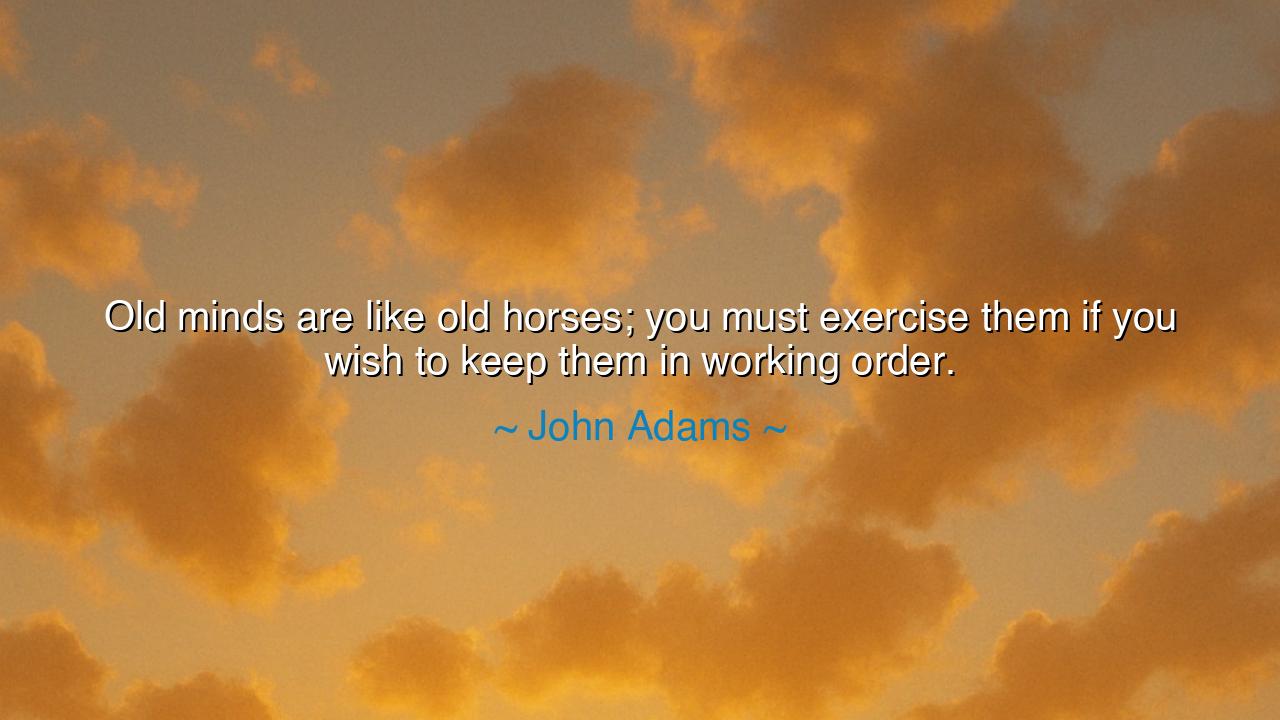
Old minds are like old horses; you must exercise them if you wish
Old minds are like old horses; you must exercise them if you wish to keep them in working order.






"Old minds are like old horses; you must exercise them if you wish to keep them in working order." These words from John Adams carry with them a profound truth that resonates through the ages: the mind, like the body, requires exercise to remain vibrant and capable. Just as an old horse, if neglected, will become stiff and sluggish, so too will an aging mind, if left dormant, lose its sharpness and agility. This analogy speaks to the very essence of what it means to age gracefully—not simply to exist, but to remain engaged, active, and mentally fit throughout one's years. To age without tending to the mind is to allow it to fall into disrepair. To exercise the mind is not merely a matter of avoiding decline, but of ensuring that we continue to live a life of purpose, growth, and contribution, even in the later stages of our journey.
In the vigorous years of youth, the mind is often an untamed force, a well-spring of ideas and thoughts that move quickly, without effort. It is easy to believe, in the bloom of youth, that our intellectual abilities will always remain sharp, and that mental fitness is something that needs no attention. But middle age and old age bring with them a quieter reality, a realization that mental faculties—like the muscles of the body—become stiff and slow without regular exercise. To fail to engage the mind is to allow the years to pass without growth. It is no longer enough to merely rely on the knowledge we accumulated in youth; we must continue to train and expand our minds to ensure that we remain sharp, engaged, and capable in our later years.
The ancient philosophers understood this well. Socrates, in his later years, continued to engage in dialogue and intellectual pursuits, not out of necessity, but out of desire to keep his mind active. He famously said, “The unexamined life is not worth living,” suggesting that without constant mental engagement and reflection, life loses its meaning. Socrates’ commitment to questioning and seeking wisdom, even in his old age, serves as a powerful example of how the mind must be continually exercised to remain in working order. He chose to remain intellectually active, continuing to learn, question, and grow, a habit that allowed him to retain his sharpness and clarity of thought until the end of his days.
Consider the example of Leonardo da Vinci, whose mind remained a flurry of activity even in his later years. As he aged, da Vinci’s body weakened, but his intellectual curiosity and passion for learning never diminished. In his later years, he turned to engineering, anatomy, and mechanics, continuing to design and create even as his physical strength began to fail him. Da Vinci was never content to rest on the laurels of his early genius; instead, he sought to push the boundaries of knowledge, ensuring that his mind remained in constant motion, ever seeking to understand and create. His life teaches us that aging is not a time of mental rest, but an opportunity to engage even more deeply with the world, to exercise the mind as one would a muscle, and to continue growing and contributing.
Yet, for many of us, the thought of mental decline as we grow older is a frightening prospect. Aging does not have to mean the loss of mental clarity. It is not simply enough to avoid physical decline; we must also actively engage the mind—through reading, writing, learning, and thinking deeply about the world around us. The key is not to let the mind stagnate in retirement or in the later years of life. To remain productive in old age, one must take up the challenge of mental exercise just as one would physical exercise—by engaging in activities that stimulate thought and creativity, that provoke new ideas, and that challenge our understanding of the world.
The lesson here is clear: to age productively, one must continue to nourish the mind. The mind, like the body, requires care, attention, and exercise to remain strong and agile. If we are to avoid the mental stagnation that comes with old age, we must embrace the daily practice of mental engagement. Whether through learning new skills, reading, writing, or simply engaging in thoughtful conversation, we must commit ourselves to keeping the mind in working order, even as our bodies age. Intellectual growth does not end with middle age; it can continue into old age, if we choose to remain active, curious, and invested in the life of the mind.
Let us then, in our own lives, take John Adams’ wisdom to heart. Let us cultivate a life of intellectual exercise, whether through the pursuit of knowledge, the cultivation of wisdom, or the deepening of our understanding. Let us commit to sharpening our minds, regardless of age, knowing that to grow old is to also have the opportunity to grow in knowledge, insight, and purpose. The surest way to maintain a life of meaning and clarity is to keep our minds as active as our bodies, to engage with the world with the same passion for learning that we had in our youth. For as Socrates and da Vinci have shown, the mind can remain a powerful force of growth and contribution, long into the later years of life.






AAdministratorAdministrator
Welcome, honored guests. Please leave a comment, we will respond soon